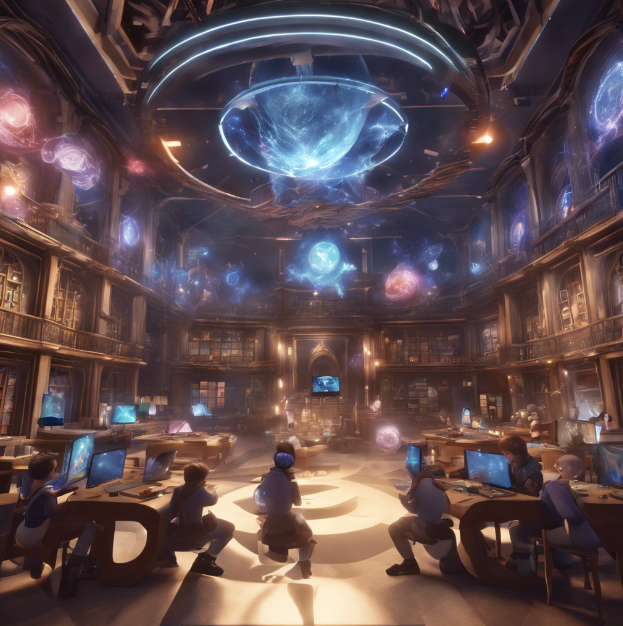Revolutionizing Education Through the Metaverse: An Immersive Learning Experience
- Danijela Milošević

- 17 ago 2023
- 2 Min. de lectura
Actualizado: 14 ago 2024
In the modern era, the educational landscape is undergoing a transformative shift as emerging technologies like the metaverse redefine the way we learn, teach, and interact with knowledge. The metaverse, a collective virtual shared space, offers boundless possibilities for enhancing education across all levels. From elementary to higher education, this immersive digital realm has the potential to revolutionize traditional teaching methods and create a dynamic learning experience that resonates with students of all ages.
Immersive Exploration for Young Minds:
In elementary education, the metaverse becomes a gateway to captivating journeys of exploration and discovery. Students can venture into historically significant events, traverse ecosystems teeming with biodiversity, or embark on intergalactic adventures – all from the confines of their classrooms. By engaging young learners through interactive simulations and virtual field trips, the metaverse breathes life into textbooks, fostering a deep understanding of complex concepts and nurturing a lifelong love for learning.
Secondary Education: Fostering Deeper Understanding:
For secondary education, the metaverse takes learning to the next level with its capacity to simulate intricate experiments and intricate scenarios. Students can manipulate virtual molecules in chemistry, conduct physics experiments in microgravity environments, or analyse historical events by immersing themselves in the past. This immersive learning experience encourages critical thinking and problem-solving, empowering students to grasp abstract concepts with unparalleled depth.
Higher Education: Bridging Boundaries and Expanding Horizons:
In higher education, the metaverse breaks down geographic barriers, enabling students and educators from across the globe to convene in a shared digital space. Collaborative research, professional training, and networking opportunities are enhanced through virtual conferences and workshops. Moreover, students pursuing careers in fields like medicine, architecture, or engineering can gain practical experience through advanced simulations and virtual labs, ensuring they are well-prepared for the real-world challenges that await them.
A Holistic Approach to Education:
The metaverse offers more than just an immersive learning environment; it fosters holistic development. Students cultivate creativity by designing virtual worlds, enhance communication skills through collaborative projects, and adapt to technology-driven workplaces. However, the integration of the metaverse requires a balanced approach – one that preserves the essence of traditional teaching methods while harnessing the power of technology to enhance the educational journey.
As education transcends physical boundaries and embraces the digital realm, the metaverse promises an education that is dynamic, engaging, and globally interconnected. By harnessing the potential of this transformative technology, educators and learners alike are poised to embark on a journey that empowers them to unlock their full potential and contribute to shaping a future marked by innovation and knowledge. The metaverse is not merely a tool; it is the gateway to a new era of education, one where the boundaries of the classroom are redefined, and learning becomes an immersive adventure of discovery and growth.
Danijela Milošević

.png)





Comentarios